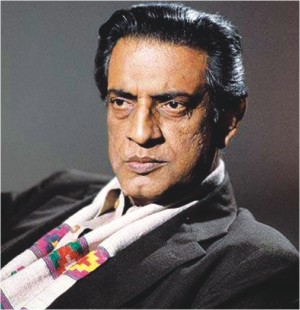Feature
Satyajit Ray
Film maker, writer, composer
Mohammad Shahidul Islam
 THE only Bengali to have triumphed the Oscar for lifetime achievement in films, Satyajit Ray needs no prologue. A versatile mastermind, this 6'4'' man showed his talent as a director, producer, writer, composer and even a graphic designer. THE only Bengali to have triumphed the Oscar for lifetime achievement in films, Satyajit Ray needs no prologue. A versatile mastermind, this 6'4'' man showed his talent as a director, producer, writer, composer and even a graphic designer.
Ray was born on May 2, 1921 in a respectable family of Kolkata. His father, Sukumar Ray and grandfather Upendrakishore Raychowdhury, were both writers. The former even used to write nonsense rhymes and children's literature. The young 'Manik', Ray's nick name, was fascinated by art, especially the motion picture. After graduating in economics from Kolkata's Presidency College, Satyajit enrolled himself at Shantiniketan to be schooled in commercial art.
D.J. Keymer, a British run advertising agency recruited him as junior visualiser in 1943. It was his first job. He spent the next 13 years here, until he became a full-time filmmaker after the success of his first film Pather Panchali.
Satyajit was especially engrossed in working for children. He wrote many short stories including the celebrated detective series Feluda for children. His stories are simple and entertaining and deal with topics as varied as horror and science fiction.
Satyajit also revived Sandesh, a children's magazine founded by his grandfather Upendrakishore Raychowdhury, to which he contributed illustrations, verses and stories throughout his life.
So interested was Satyajit in cinema that during a six-month trip to Europe in 1950 Ray became a member of the London Film Club and managed to see ninety-nine films in only four-and-a-half months! A meeting with the famous film director Jean Renoir in Kolkata in 1949 and a business trip to London in 1950, where he saw Vittorico De Sica's "The Bicycle Thief (1949)", had such an influence on Ray that he became determined to make films in his own fashion.
With absolutely no practical skill in movie making and no financial support, Ray started picking up knowledge from books on the subject and got together a group of equally inexperienced but enthusiastic youngsters to work with him on the dream project.
The experience was enlightening as Ray himself said, "One day's work with camera and actors taught me more than all the dozen books." The result was "Pather Panchali," (1955) a film that won international fame for its simplicity and originality.
Satyajit's interest in cinema led him to co-found Kolkata's first film society in 1947. All the films the society screened and discussed were foreign. "To be quite honest," Ray writes, "we found nothing worth studying in Bengali films from an aesthetic point of view."
After the success of Pather Panchali, there was no stopping Ray. He moved from one success to another, making 29 films in 37 years. He wrote his own screenplays, which were frequently based on stories he had written or illustrated, usually sketched out each scene before shooting it and handled the camera and editing work as well. Since 1962, Ray even composed the music for all his films. That's not all - Ray even designed posters for publicizing his new releases!
Pather Panchali had two sequels Aparajito (The undefeated - 1956) and Apur Sansar (The World of Apu - 1959). Together the three films are known as the 'Apu Trilogy'.
In his films, Satyajit Ray tried to capture nature in its element. This was often a difficult task. While filming Aparajito, for example, Ray wanted to capture the chorus of fireflies at night on the camera. But the light that the fireflies gave off was too weak to be filmed and strong lights would have taken away the charm of the scene. So Ray thought of a new way. A bunch of bare-bodied assistants, wearing black loincloths were made to hold tiny flashing bulbs. The assistants hopped around in total darkness giving the desired effect.
Satyajit's films were studied in Indian film schools, and watched repeatedly by hopeful filmmakers. Satyajit's films were often criticized for highlighting the poverty of West Bengal. Some people even find them too creative. The famous writer Khushwant Singh, for example, wrote that he 'dozed off' in the cinema hall while watching Pather Panchali!
In 1992, Satyajit Ray was honored with an Oscar for Lifetime Achievement. He received the award from his sickbed in Kolkata, through a special live satellite-television event. The award was followed by the Indian Government's recognition in the form of the Bharat Ratna, the ultimate honor for any Indian.
Satyajit Ray died on April 23, 1992 at the age of 70. This 23rd April, 2008 marked his 16th death anniversary. We remember this singular genius on this day.
Mohammad Shahidul Islam teaches Tourism at National Hotel and Tourism Training institute, Dhaka, Bangladesh.
| 